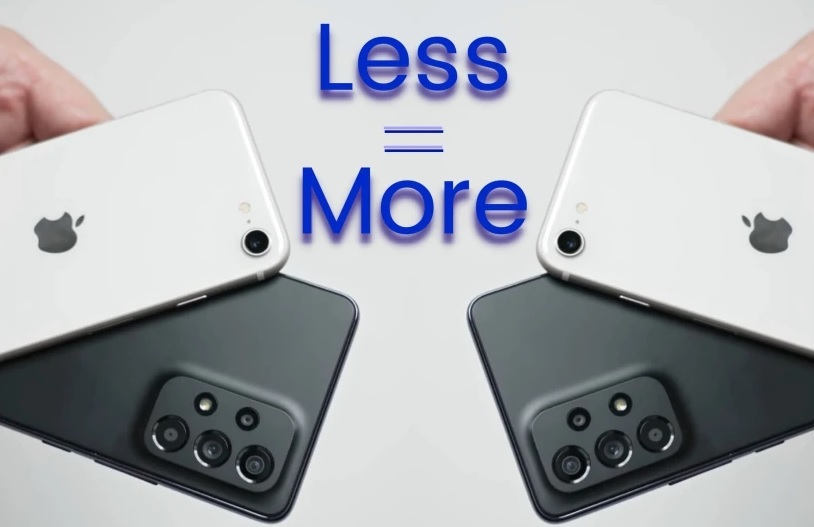It's time for Samsung to equip high-end chips for mid-range phones
Samsung should learn from Apple and Google to equip modern chips for its mid-range smartphones to meet the needs of customers.
LinkedIn co-founder: Establishing friendships 'may be the most important thing in life'
Hackers "take over" the largest US network?
The electric car manufacturer's headache is hailed by Jeff Bezos: Billions of dollars are burned, but buyers wait 3 years and still have not received the car
In 2016, Apple decided to launch the first mid-range iPhone model – iPhone SE. iPhone SE is expected by many people thanks to its reasonable price ($400), beautiful photography and video recording, smaller than other smartphones on the market. However, most notably, the iPhone SE uses the state-of-the-art A9 chip found on the high-end iPhone 6S and 6S Plus.
Since then, Apple is the only company that "dared" to put new chips on popular phones. iPhone SE (2020) is the 8th best-selling smartphone in 2021, so it can be affirmed that CEO Tim Cook's tricks have paid off.

Apple users benefit a lot from this decision of "apple defect". The original iPhone SE is still performing quite well despite being released for more than 6 years. The device can run the latest iOS operating system and is on the list of Apple support. There's no reason for the iPhone SE (2020) and iPhone SE (2022) not to follow such a route (software updates in 5-6 years and works well in the long run).
Recently, Google also learned from Apple when it introduced the Google Pixel 6A, equipped with a high-end chip for a mid-range device. Specifically, Pixel 6A uses Tensor chip developed by Google itself. Tensor made its debut on the Pixel 6 and Pixel 6 Pro flagships in 2021. This is Google's biggest hardware achievement in history. Although it lags behind the Apple A15 Bionic in terms of performance, Tensor is still faster and smarter than most mid-range chips.
This raises the question why Samsung , a big name in the mobile market, has not made a similar move. In April this year, the Korean technology giant launched the Galaxy A53 (5G) with many attractive features. A53 (5G) owns a 120Hz screen, a huge 5,000mAh battery. The only downside is that the device uses an Exynos 1280 chip, equivalent to last year's Snapdragon 778G (used on the Galaxy A52 5G) and certainly cannot keep up with the chips of the iPhone SE (2022) and Pixel 6A.
According to the Geekbench 5 and Antutu 9 calibration tests, the Exynos 1280 chip is 135% worse in CPU performance and almost 100% in GPU performance than the A15 Bionic chip. Compared to Tensor, it is 50% and 75% worse, respectively. Galaxy A53 users on Reddit, Twitter and XDA Forums forums also reported slow and jerky performance during use such as when scrolling the screen, opening the camera, taking pictures, etc.
Even at the same price range as the iPhone SE or Pixel, the Galaxy A53 cannot be as smooth as the two competitors. That is a worrying thing. A good chip will affect many other aspects of the smartphone experience, especially the camera. Thanks to Tensor, the Google Pixel 6 can take better photos than many other budget smartphones, while thanks to the A15 Bionic, the iPhone SE records videos in low light better than Android phones in the same segment.
With the above reasons, it is time for Samsung to equip new chips for its mid-range smartphones.
- What is a Web Application Firewall (WAF) difference between blacklist and whitelist?
- Guide setup Configure a web application firewall (WAF) for App Service
- News Cloud Storage Backup Data VPS | What’s new at Vultr?
- What is a cloud server and how does it work? Create your Cloud Backup business?
- Review service Products and pricing Platform Google Cloud Storage
Operate and exploit advertising by iCOMM Vietnam Media and Technology Joint Stock Company.
116 Thai Ha, Trung Liet Ward, Dong Da District, Hanoi.
Email: info@more.edu.vn
Editor in chief: Tran Vo
Tel: (+84) 903076053/7 Fax: (+84) 903030935